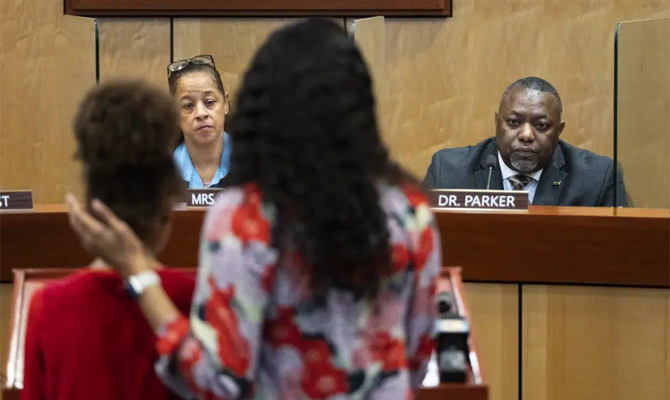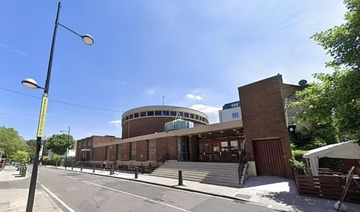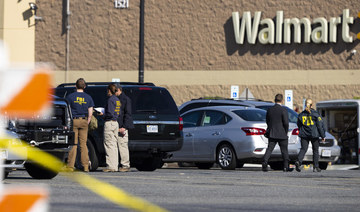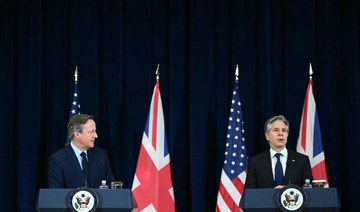NEWPORT NEWS, Virginia: When a 6-year-old shot and wounded his first-grade teacher in this shipbuilding city near Virginia’s coast, the community reacted with collective shock.
But the sentiment has percolated into rage from parents and particularly from teachers, with many lambasting school administrators Tuesday night for what they called a misguided emphasis on attendance and other education statistics over the safety of children and staff.
The anger in Newport News is bubbling up during a decadeslong pendulum swing that’s been moving American schools away from suspensions and expulsions, experts say. But some school systems are still seeking a “happy medium” between strict discipline and a gentler approach.
During a three-hour school board meeting dedicated solely to public comment, Newport News teachers and parents said students who assaulted classmates and staff were routinely allowed to stay in the classroom with few consequences. They said the shooting of Abigail Zwerner could have been prevented if not for a toxic environment in which teachers’ concerns are systemically ignored.
“Every day in every one of our schools, teachers, students and other staff members are being hurt,” high school librarian Nicole Cooke told the board. “Every day, they’re hit. They’re bitten. They’re beaten. And they’re allowed to stay so that our numbers look good.”
Addressing superintendent George Parker, Cooke said: “If Abigail had been respected, she wouldn’t be in the hospital right now.”
Zwerner was shot Jan. 6 as she taught her first-grade class at Richneck Elementary. There was no warning and no struggle before the 6-year-old pointed the gun at his teacher and fired one round, police said.
The bullet pierced Zwerner’s hand and struck her chest. The 25-year-old hustled her students out of the classroom before being rushed to the hospital.
Newport News police said the 6-year-old’s mother legally purchased the gun but that it was unclear how her son gained access to it. A Virginia law prohibits leaving a loaded gun where it is accessible to a child under 14, a misdemeanor crime punishable with a maximum one-year prison sentence and $2,500 fine. No charges have been brought against the mother so far.
Community reaction shifted into anger late last week after the superintendent revealed that Richneck administrators had learned the child may have had a weapon before the shooting. But a search did not find the 9mm handgun despite staff looking through his bag.
Zwerner’s shooting was “completely preventable — if the red flags had been taken seriously and proper procedures clearly communicated and followed,” Amber Thomas, a former school psychologist in Newport News, told the board.
Thomas left the school system last year after working there for a decade. In an interview with The Associated Press, she recalled a time when a “teacher was assaulted by a student — and that student faced no disciplinary action at all.”
“A school counselor and I were often called to intervene with explosive behaviors,” said Thomas, who served three elementary schools at a time, although not Richneck. “And the administrator would see what was going on and turn around and walk the other way.”
Cindy Connell, a middle school teacher who also addressed the board, told the AP that school system leaders fear angering parents and are too focused on limiting discipline such as suspensions.
They’re afraid, she said, that pulling kids out of the classroom will imperil a school’s accreditation.
“Our administrators are under an intense pressure to make everything appear better than it is in reality,” Connell said.
Zwerner’s shooting did not shock Connell.
“I have teacher friends who have been hit by kindergarteners, kicked by kindergarteners, punched by kindergarteners, stabbed with pencils by kindergarteners,” she said. “So the only difference is that this child had access to a weapon at home. So, if you put those two things together, I’m not surprised.”
Michelle Price, a spokeswoman for the school board, did not immediately respond to an email from The Associated Press asking for comment on the various criticisms expressed Tuesday night.
William Koski, a Stanford law professor and director of the school’s Youth and Education Law Project, said many schools in the US had strict zero-tolerance discipline policies in the 1990s, but began to depart from that approach about a decade later, as concerns grew that suspensions and expulsions were failing to help students, while feeding the school-to-prison pipeline and disproportionately affecting Black children.
“If you get expelled a lot, you are just more likely to head down that path, to not graduate, to end up not being a very productive person,” Koski said.
Educators have shifted to a gentler approach that focuses on creating a safe and positive school climate, while zeroing in on the root causes of behavioral problems.
Koski said he understands the frustrations of teachers in Newport News and elsewhere. He said that some school systems may still be in search of a “happy medium” between the two approaches.
But Republicans in Virginia’s House of Delegates appear to want to push the pendulum back. A bill filed last month would require the state Department of Education to establish a uniform discipline system for students. It would include criteria for teachers to remove disruptive students from class, while making removal mandatory if the behavior is violent.
Newport News is a racially diverse city of about 185,000 people — about 45 percent white and 41 percent Black — that sits along the James River near the Chesapeake Bay. It’s probably best known for its sprawling shipyard, which builds the nation’s aircraft carriers and other US Navy vessels.
About 15 percent of the population lives in poverty, according to US Census data. More than 400 of the nearly 1,000 incidents of violent crime in the city in 2021 involved a handgun or firearm, according to FBI statistics.
“Gun violence has become a constant for our students,” William Fenker, an eighth-grade science teacher, told the board. “It has been a salient issue in our community for some time now ... (and) has even made its way into our schools.”
Newport News schools have endured two other shootings in a little over a year.
In September 2021, two 17-year-old students were wounded when a 15-year-old boy fired shots in a crowded high school hallway after he had a fight with one of the students.
Two months after that shooting, an 18-year-old student fatally shot a 17-year-old in the parking lot of a different high school after a football game. Police said the teens exchanged “gestures” in the gym before an altercation broke out.
“Our students do not wonder if there will be another school shooting,” Fenker told the board. “They wonder when and where the next shooting will be.”
Last week, the school board announced that 90 walk-through metal detectors would be placed in schools across Newport News, starting with the one where Zwerner was shot.
But that failed to satisfy many parents at Tuesday night’s board meeting.
Doug Marmon, who has two children in school, called for the removal of the school system’s executive leadership and for many more security measures. He also wants the system to change how it addresses bad behavior.
“Students need to be held accountable for their actions, regardless of age or circumstances — not transferred to another school or placed in a different classroom,” he said.
Another parent, David Wilson, said the problem starts at home. But he also questioned the impact of removing children from the classroom.
“We can do what everybody wants to do — we can start suspending more kids, sending them home,” Wilson said.
“So you just prevented a school shooting but you just caused a 7-Eleven shooting,” he said. “You didn’t solve the issue. You shifted the issue from one thing to another.”
Anger grows in Virginia city where first-grader shot teacher
https://arab.news/bse4x
Anger grows in Virginia city where first-grader shot teacher

- The anger in Newport News is bubbling up during a decadeslong pendulum swing that’s been moving American schools away from suspensions and expulsions, experts say
OIC calls for immediate aid amid Afghan flood crisis

- Flash floods from seasonal rains in Baghlan province in northern Afghanistan
RIYADH: The Organization of Islamic Cooperation has issued an urgent appeal to its member states as well as relief organizations to provide aid to the Afghan people amid catastrophic flooding which has hit the country, Saudi Press Agency reported on Sunday.
Flash floods from seasonal rains in Baghlan province in northern Afghanistan killed at least 315 people since striking on Friday, a UN report said.
Rains also caused heavy damage in northeastern Badakhshan province and central Ghor province, officials said.
Since mid-April, floods have left about 100 people dead in 10 of Afghanistan’s provinces, with no region entirely spared, according to authorities.
Farmland has been swamped in a country where 80 percent of the more than 40 million people depend on agriculture to survive.
UK investigating Hamas’ claim that British hostage killed in Gaza

- Foreign secretary confirms viewing video
LONDON: The UK’s Foreign Office said on Sunday it was investigating a claim by Hamas that a British-Israeli hostage in Gaza had died from injuries sustained in an Israeli airstrike over a month ago.
Nadav Popplewell, 51, was captured along with his mother Channah Peri on Oct. 7 during a border incursion when the Palestinian group launched a surprise attack on Israel.
The Foreign Office said it was actively seeking more information on the matter.
Popplewell’s family has requested media outlets refrain from airing footage released by Hamas, showing him in captivity with visible injuries, the BBC reported.
The UK’s Foreign Secretary David Cameron, speaking to the BBC’s Laura Kuenssberg, confirmed viewing the video but provided no further updates on the investigation.
Cameron said: “We don’t want to say anything until we have better information.”
He described Hamas as “callous” for releasing the video and playing “with the family’s emotions in that way.”
The Foreign Office added that the department’s thoughts “are with his family at this extremely distressing time.”
The Israeli military has not issued a statement on the matter.
Israel’s military campaign in Gaza to destroy Hamas has killed over 34,900 people, the majority of whom are women and children, according to the Gaza Health Ministry.
Israel has reported that 128 hostages are unaccounted for.
UK mountaineer logs most Everest climbs by a foreigner, Nepali makes 29th ascent

- Both climbers used Southeast Ridge route to summit
- They were on separate expeditions guiding their clients
KATMANDU: A British climber and a Nepali guide have broken their own records for most climbs of Mount Everest, the world’s highest mountain, hiking officials said on Sunday.
Rakesh Gurung, director of Nepal’s Department of Tourism, said Britain’s Kenton Cool, 50, and Nepali guide Kami Rita Sherpa, 54, climbed the 8,849-meter (29,032 foot) peak for the 18th and 29th time, respectively.
They were on separate expeditions guiding their clients.
“He just keeps going and going... amazing guy!” Garrett Madison of the US-based expedition organizing company Madison Mountaineering said of the Nepali climber. Madison had teamed up with Kami Rita to climb the summits of Everest, Lhotse, and K2 in 2014.
K2, located in Pakistan, is the world’s second-highest mountain and Lhotse in Nepal is the fourth-tallest.
Lukas Furtenbach of the Austrian expedition operator Furtenbach Adventures called Cool’s feat remarkable.
“He is a fundamental part of the Everest guiding industry. Kenton Cool is an institution,” Furtenbach, who is leading an expedition from the Chinese side of Everest, told Reuters.
Both climbers used the Southeast Ridge route to the summit.
Pioneered by the first summiteers, New Zealander Sir Edmund Hillary and Sherpa Tenzing Norgay in 1953, the route remains the most popular path to the Everest summit.
Kami Rita first climbed Everest in 1994 and has done so almost every year since, except for three years when authorities closed the mountain for various reasons.
He climbed the mountain twice last year.
Mountain climbing is a major tourism activity and a source of income as well as employment for Nepal, home to eight of the world’s 14 tallest peaks, including Everest.
Nepal has issued 414 permits, each costing $11,000 to climbers for the climbing season that ends this month.
Banning UK arms exports to Israel would strengthen Hamas, UK’s Cameron says

- Cameron said he did not support an operation in Rafah in the absence of a plan to protect hundreds of thousands of civilians
LONDON: Stopping British arms sales to Israel if it launches a ground assault on Rafah in the Gaza Strip would strengthen Hamas, Britain’s Foreign Secretary David Cameron said on Sunday.
Israel ordered Palestinians to evacuate more of the southern city on Saturday in an indication it was pressing ahead with its plans for a ground attack, despite US President Joe Biden’s threat to withhold the supply of some weapons if it did so.
Cameron said he did not support an operation in Rafah in the absence of a plan to protect hundreds of thousands of civilians sheltering in the southern border city.
However, Britain was in a “completely different position” to the United States in terms of providing arms to Israel, he said, noting that the less than 1 percent of Israel’s weapons that came from Britain were already controlled by a strict licensing system.
“We could, if we chose to, make a sort of political message and say we are going to take that political step,” he told the BBC’s Laura Kuenssberg.
“The last time I was urged to do that (...), just a few days later there was a brutal attack by Iran on Israel, including 140 cruise missiles,” he added.
Cameron said the “better answer” would be for Hamas, which controls Gaza, to accept a hostage deal.
“Just to simply announce today we’re going to change our whole approach to arms exports rather than go through our careful process, it would strengthen Hamas, it would make a hostage deal less likely, I don’t think it would be the right approach,” he said.
Hamas attacked southern Israel on Oct. 7, killing some 1,200 people and taking more than 250 people hostage, according to Israeli tallies.
Israel’s military response in Gaza has killed close to 35,000 Palestinians, according to Gaza’s health ministry.
‘Completely helpless’: Afghanistan’s north struggles to get aid after deadly floods

- Thousands of houses and livestock were also wiped out by the flash floods
- Afghanistan is prone to natural disasters, considered vulnerable to climate change
KABUL: Survivors of the deadly flash floods that ripped through northern Afghanistan were still struggling without basic aid on Sunday, as the official death toll rose to over 300.
Heavy rains on Friday triggered flash floods across at least seven provinces, including Baghlan, Ghor, Badakhshan and Takhar, injuring more than 1,600 people and destroyed about 2,600 houses, according to the latest data from Afghanistan’s Ministry of Refugees.
Many people remain missing and livestock were wiped out as survivors picked through muddy, debris-littered streets and damaged buildings over the weekend, while authorities and humanitarian agencies deployed aid and rescue workers.
“All available resources are being mobilized, and relevant ministries and agencies are actively engaged in delivering urgent aid,” Mullah Abdul Ghani Baradar Akhund, Afghanistan’s deputy minister for economic affairs, told survivors in Baghlan province on Sunday, as he reassured “unwavering support” from the Taliban-led government “until their lives are restored to normalcy.”
But some people in the province, which bore the brunt of the deluges, said that aid has yet to reach them.
“We haven’t received any support from the government or aid organizations yet. Everyone comes and asks us questions, then they go back,” Ghulam Nabi, who is from the province’s Burka district, told Arab News in a phone interview.
“We lost our houses and our lives. Everything we had is under mud now. The agriculture land and livestock, our only source of livelihood, are also completely destroyed. We don’t have the basic means to cook food for ourselves.”
Since mid-April, flash flooding and other floods had left scores of people dead and destroyed farmlands across Afghanistan, a country where 80 percent of its more than 41 million people depend on agriculture to survive.
The South Asian nation is prone to natural disasters and is considered by the UN to be one of countries most vulnerable to climate change.
Aid group Save the Children said about 600,000 people, half of them children, live in the five districts in Baghlan that have been severely impacted by the recent floods.
“Lives and livelihoods have been washed away. The flash floods tore through villages, sweeping away homes and killing livestock. Children have lost everything,” Arshad Malik, the group’s country director in Afghanistan, said in a statement.
Most of the affected areas are still cut off on Sunday, inaccessible by trucks as roads and bridges were damaged by the floods, which also impacted other public infrastructure.
People were struggling to access essential health services, the World Health Organization said in a statement, as “several health facilities remain non-operational.”
Abdul Fatah Jawad, director of Ehsas Welfare and Social Services Organization, said that many of the flood survivors were still in shock.
“People are so scared and traumatized. Most houses that survived the flooding are emptied as people fear more floods. Families took refuge in school yards and deserted areas far from residential houses,” Jawad told Arab News.
He said families are in urgent need of basic goods, such as food, drinking water, medicine, tents, blankets and shelter. Since Saturday, his organization has managed to deliver cooked food for hundreds of families.
“People, particularly children, need to eat something … They also need cash to rebuild their houses and their businesses,” he said. “Some families lost everything — house, land, livestock, business. They are completely helpless.”



















